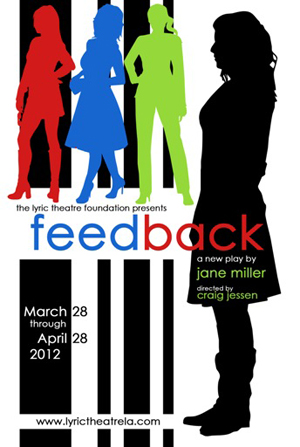FEEDBACK: THE BIG TEASE
Everything that works and doesn’t work about Jane Miller’s new play Feedback turns on one thing: Nudity. In terms of talking the talk, the whole exercise is about getting naked’”literally at first, then emotionally. Yet when it comes time to walk the walk, bra and panties stay firmly in place. And that’s a problem.
At the top of the show, a young woman named Holly (April Grace Lowe) enters and immediately removes most of her clothes’”but leaves on her underwear. She is being observed by unseen people in some fashion that is as yet unclear, and is told that she must remove all clothing in order to be fully and properly assessed. Holly desperately tries to get out of it, but Elizabeth, the nervous woman who seems to be in charge (Angela Ryskiewicz), is insistent. After much back and forth about how the vulnerability and full disclosure of complete nudity is vital, Holly reluctantly agrees. She starts to undo her bra as the lights fade.
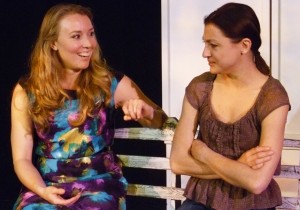 But in half-light, the actress clearly doesn’t follow through. Bra stays firmly in place and she quickly executes her costume change, moving on to the next scene. That we aren’t even left with the illusion of her being humiliated and forced to undress completely underlies the lack of conviction that hinders the show in reaching its full potential in other areas.
But in half-light, the actress clearly doesn’t follow through. Bra stays firmly in place and she quickly executes her costume change, moving on to the next scene. That we aren’t even left with the illusion of her being humiliated and forced to undress completely underlies the lack of conviction that hinders the show in reaching its full potential in other areas.
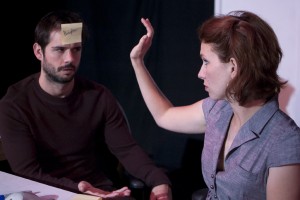 This is not meant to be some sort of prurient argument for tits and ass. Most stage nudity actually makes me slightly uneasy. (The Curse of the Starving Class is the ultimate example. Not only does playwright Sam Shepard ask his lead actor to do frontal nudity, but the actor is supposed to urinate. Talk about performance anxiety’”the whole thing takes me right out of the moment and into a thousand questions: Does the actor have to drink a lot of water before the show? Beer? Is he worried he won’t be able to pee? If the theater is cold, does he worry about being a “grower” instead of a “shower?”)
This is not meant to be some sort of prurient argument for tits and ass. Most stage nudity actually makes me slightly uneasy. (The Curse of the Starving Class is the ultimate example. Not only does playwright Sam Shepard ask his lead actor to do frontal nudity, but the actor is supposed to urinate. Talk about performance anxiety’”the whole thing takes me right out of the moment and into a thousand questions: Does the actor have to drink a lot of water before the show? Beer? Is he worried he won’t be able to pee? If the theater is cold, does he worry about being a “grower” instead of a “shower?”)
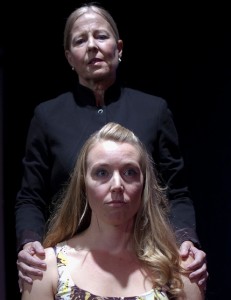 Similarly, as Ms. Lowe began to disrobe in the intimate space of the Lyric Theatre, I found myself hoping for her sake that she didn’t have to go all the way. But as the story began to be revealed’”that she is at a crossroads in her life where she is seeking to be “rebranded”’”totally deconstructed, rearranged, and made new and improved’”it becomes clear that the gurus behind this rebranding effort (a company named Perceptions) must be able to see and assess absolutely every inch of her, inside and out in order to re-brand the core of her being.
Similarly, as Ms. Lowe began to disrobe in the intimate space of the Lyric Theatre, I found myself hoping for her sake that she didn’t have to go all the way. But as the story began to be revealed’”that she is at a crossroads in her life where she is seeking to be “rebranded”’”totally deconstructed, rearranged, and made new and improved’”it becomes clear that the gurus behind this rebranding effort (a company named Perceptions) must be able to see and assess absolutely every inch of her, inside and out in order to re-brand the core of her being.
It’s a genuinely clever concept. Every aspect of our media culture is predicated on defining and selling something’”a show, a celebrity, a product’”so why not apply that process to ordinary life? Holly is in a dead-end job, still mourning her recently deceased mother, and is on the edge of giving up on her longtime romantic partner Ian (Cody Roberts). She needs rebranding. She needs to figure out how to become “Holly 2.0.”
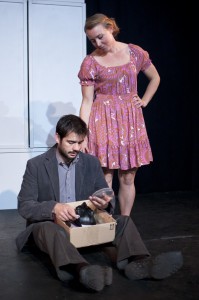 Judith (Dorrie Braun) is the stylish, commanding older woman who has created a revolutionary system of repurposing one’s own life. In an Orwellian system of direct assessment, as well as anonymous, indirect assessment, every aspect of a person’s life is observed and evaluated. Behaviors that help sell one’s brand are encouraged. Anything that distracts from the brand’s impact is discarded’”things like being shy, or apologizing too much, or having empathy.
Judith (Dorrie Braun) is the stylish, commanding older woman who has created a revolutionary system of repurposing one’s own life. In an Orwellian system of direct assessment, as well as anonymous, indirect assessment, every aspect of a person’s life is observed and evaluated. Behaviors that help sell one’s brand are encouraged. Anything that distracts from the brand’s impact is discarded’”things like being shy, or apologizing too much, or having empathy.
Judith oversees Elizabeth, who is Holly’s direct facilitator. The boundaries between the two women fall; passions and convictions ebb and flow; Holly and Ian struggle with whether they want to be together; and releasing “Holly 2.0” turns out to be a prohibitively complicated undertaking.
April Grace Lowe has an inestimably natural, gentle stage presence that allows her emotional transitions to feel surprising and fresh. She has the ability to blush from head to toe and make it real. You see how she feels’”making a lot of the character’s exposition about her feelings rather superfluous. Cody Roberts has an easy charm that is beguiling, even when the character’s dialogue and actions are not. He and Lowe are great together. They have a believable chemistry that makes you root for them’”but as actors’”not as characters.
Holly’s workmate Claudia (Karen DeThomas) is a well-meaning if sometimes intrusive friend who is lumbered with an improbable plot twist in the second act that badly undermines the character’s usefulness to the story. DeThomas has great performance energy, but is given little to actually perform.
Director Craig Jessen is good with his actors, and Miller has come up with a big idea. I just wish the playwright had the confidence to let that idea truly run amok in our lunatic culture’”where identity is everything but the true self is nowhere to be found.
photos by Richard M. Johnson
Feedback
Lyric Theatre in Hollywood (Los Angeles Theater)
through April 28
for tickets, visit http://www.plays411.net/feedback
